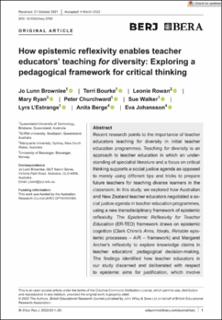| dc.contributor.author | Lunn Brownlee, Jo | |
| dc.contributor.author | Bourke, Terri | |
| dc.contributor.author | Rowan, Leonie | |
| dc.contributor.author | Ryan, Mary | |
| dc.contributor.author | Churchward, Peter | |
| dc.contributor.author | Walker, Sue | |
| dc.contributor.author | L’Estrange, Lyra | |
| dc.contributor.author | Berge, Anita | |
| dc.contributor.author | Johansson, Eva Marianne | |
| dc.date.accessioned | 2023-01-10T11:07:16Z | |
| dc.date.available | 2023-01-10T11:07:16Z | |
| dc.date.created | 2022-06-02T10:51:38Z | |
| dc.date.issued | 2022 | |
| dc.identifier.citation | Lunn Brownlee, J., Bourke, T., Rowan, L., Ryan, M., Churchward, P., Walker, S., ... & Johansson, E. (2022). How epistemic reflexivity enables teacher educators’ teaching for diversity: Exploring a pedagogical framework for critical thinking. British Educational Research Journal. | en_US |
| dc.identifier.issn | 0141-1926 | |
| dc.identifier.uri | https://hdl.handle.net/11250/3042277 | |
| dc.description.abstract | Recent research points to the importance of teacher educators teaching for diversity in initial teacher education programmes. Teaching for diversity is an approach to teacher education in which an understanding of specialist literature and a focus on critical thinking supports a social justice agenda as opposed to merely using different tips and tricks to prepare future teachers for teaching diverse learners in the classroom. In this study, we explored how Australian and New Zealand teacher educators negotiated a social justice agenda in teacher education programmes, using a new transdisciplinary framework of epistemic reflexivity. The Epistemic Reflexivity for Teacher Education (ER-TED) framework draws on epistemic cognition (Clark Chinn’s Aims, Ideals, Reliable epistemic processes – AIR – framework) and Margaret Archer’s reflexivity to explore knowledge claims in teacher educators’ pedagogical decision-making. The findings identified how teacher educators in our study discerned and deliberated with respect to epistemic aims for justification, which involve transformative critical thinking and critical thinking for self. They reported good knowledge (ideals) as being scholarly in nature, and reliable epistemic processes based on higher-order thinking (analysis and evaluating competing ideas) or engaging with multiple perspectives. The teacher educators in our study are clear examples of how strong overall evaluative epistemic stances enable teaching for social justice. We argue that the ER-TED framework can help us as a profession to address teaching for diversity in teacher education programmes based on the belief that the pursuit of social justice requires an evaluativist epistemic stance. | en_US |
| dc.language.iso | eng | en_US |
| dc.publisher | Wiley | en_US |
| dc.rights | Navngivelse 4.0 Internasjonal | * |
| dc.rights.uri | http://creativecommons.org/licenses/by/4.0/deed.no | * |
| dc.title | How epistemic reflexivity enables teacher educators’ teaching for diversity: Exploring a pedagogical framework for critical thinking | en_US |
| dc.title.alternative | How epistemic reflexivity enables teacher educators’ teaching for diversity: Exploring a pedagogical framework for critical thinking | en_US |
| dc.type | Peer reviewed | en_US |
| dc.type | Journal article | en_US |
| dc.description.version | publishedVersion | en_US |
| dc.rights.holder | The author | en_US |
| dc.subject.nsi | VDP::Samfunnsvitenskap: 200 | en_US |
| dc.source.journal | British Educational Research Journal (BERJ) | en_US |
| dc.identifier.doi | 10.1002/berj.3789 | |
| dc.identifier.cristin | 2028980 | |
| cristin.ispublished | true | |
| cristin.fulltext | original | |
| cristin.qualitycode | 2 | |

